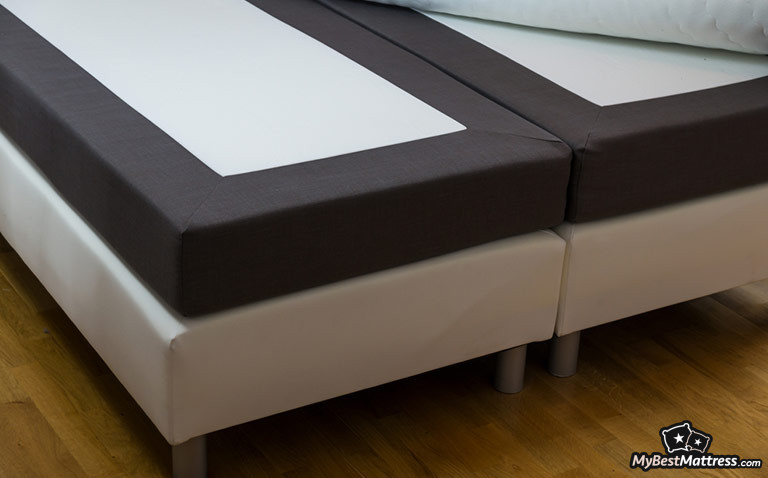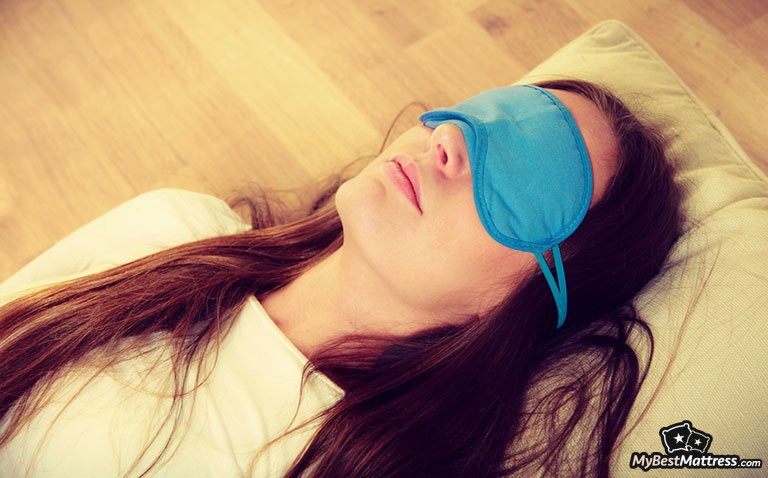
Have you ever had to sleep on the floor? I have, and when it comes to sleeping on the floor, I can’t help but think of how uncomfortable that is. Bed’s warmth, softness, and the comfort a good mattress provides are a necessity to many of us. Now try to imagine sleeping on the floor nightly.
That’s exactly what some people choose to do. They trade their soft beds for hardwood floors. If you’re anything like me, you must be thinking, why would anyone in their right mind do it? Well, people have their own reasons and expected results.
Let’s figure them out in this article!
Table of Contents
Is Sleeping on the Floor Good for You?
This subject might be a little controversial because nowadays there are many advanced technology mattresses that claim to improve your sleep and at the same time, improve your health. But looking back in history, what people used to do for ages was sleep on the floor[1]. So maybe that’s the most natural way to sleep?
Even now, there are some cultures that prefer the minimalist lifestyle of not owning a bed that has become essential to us, westerners. Most of them are tribes associated with lower development and a more primal lifestyle. But if that’s the case, why do more and more people choose this type of lifestyle and start sleeping on the floor?
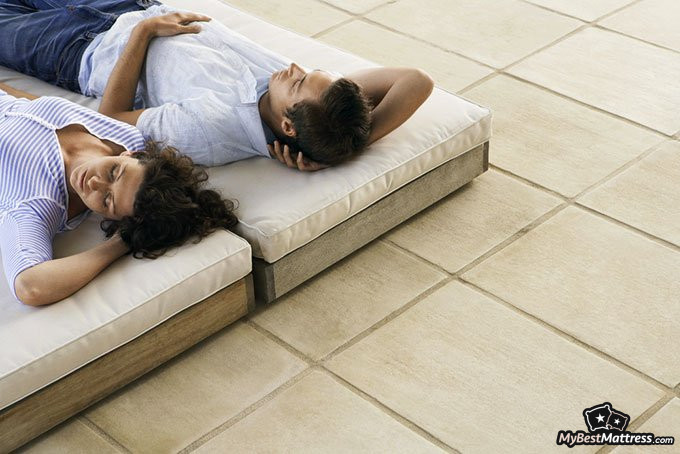
If you want to know is sleeping on the floor good for you, find out the benefits of sleeping on the floor and its drawbacks, keep on reading!
Benefits of Sleeping on the Floor
Despite some people claiming that a soft mattress is the way to go when it comes to sleep, there are quite a few benefits of sleeping on the floor.
It Helps the Posture
Firstly, it’s said to improve your posture. That is due to your body being aligned naturally. Your muscles are at work at night, keeping your posture, instead of being rested and slouching on a mattress. This way, your posture becomes better as your muscles, especially your back muscles, are strengthened.
Furthermore, there’s no sinkage when you’re sleeping on the floor. Some old mattresses or even if your current mattress is a little too soft might cause you to sink into your bed. This is never good for your posture, as you need to asses the fact that we have a natural back curve. Your back may still curve, but that would be in the wrong direction.
Alleviates Pain
Another pro of sleeping on the floor is that it is believed to alleviate back and neck pain. This statement lacks research, but there are quite a few scientific researches that say that sleeping on firmer surfaces is better for those who suffer from back pain.[2]
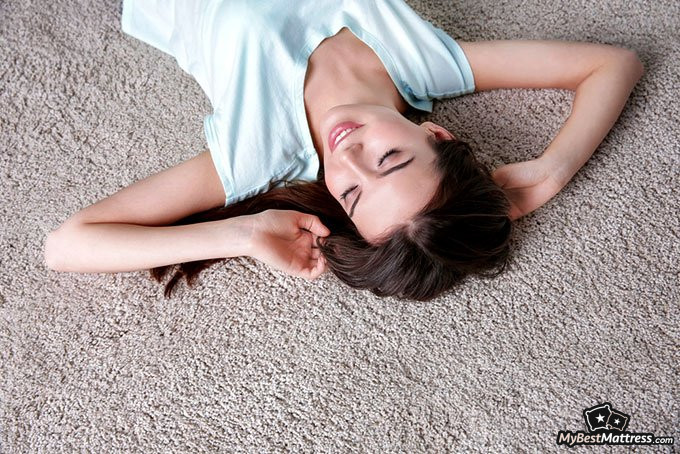
There aren’t many papers on backache and sleeping on the floor, but research shows that sleeping on a firmer mattress can help with back pain. The added firmness might be beneficial if you sleep on a soft mattress, as the floor is even firmer than mattresses, so we believe that this added firmness can help ease your back pain.
Although you should be more careful sleeping on the floor if you have any back issues. While medium firmness is said to help with backache, the floor might be just a little too firm. You're better off here sticking to a firm mattress if you're looking for ways to help your backache with firmness.
Makes You More Productive
One more benefit of sleeping on the floor could be minimizing the time you spent comfortably lying on a soft surface. While you do get used to sleeping on the floor in some time after you switch, it’s not exactly comfortable and inviting.
One way it improves your day is that it helps you get up easier. The less comfortable you are, the less you want to stay there. A warm, soft bed on a cold winter day is too hard to leave, and you end up snoozing your alarm for a few extra minutes of comfortable leisure there. Sleeping on the floor, you eliminate this craving.

Furthermore, it saves you time. Not having a bed to lie on can lead to productiveness. Just think how much time you spend snuggled up in a blanket comfortably lying watching TV or browsing social media.
Without the coziness the bed provides, you might as well just do other things you’d like to do that are a lot more productive.
Makes Your Place More Spacious
One more often overlooked advantage is that not having a bed makes a room so much more spacious. Usually, the largest object in a room is the bed. So, if you want to have more space and are onto the minimalism trend, you might want to try out sleeping on the floor instead of keeping the bed.
Latest Saatva Coupon Found:
UP TO $500 OFF
Limited-time Saatva Sale
We're sharing a limited-time Saatva mattress discount with our readers! Grab this deal & enjoy your new mattress with huge discounts.
Drawbacks of Sleeping on the Floor
Now that we talked about the benefits of sleeping on the floor, let’s cover the drawbacks too. If you want to know is sleeping on the floor good for you, the answer is that it might not be completely beneficial.
Could Get Uncomfortable
First and foremost, we have to talk about comfort. At least for me, it’s extremely hard to imagine not being able to get comfortable in bed and doze off after a hard day. The thought of bed in the evening is so appealing, and very few people would be willing to give it up.
Now, despite quite a few people giving up beds and choosing to sleep on the floor claiming it’s comfortable for them, it’s still hard to believe that. It wouldn't be easy to adjust and feel comfortable on the floor.

We’re too used softness, and our bodies have adapted to the good quality mattresses that it would take quite a bit of getting used to before we could feel at least okay sleeping on the floor.
Might Get Too Cold
Another drawback is the lack of warmth. If you’ve ever walked on the cold hard floor barefoot, you know what I’m talking about. Despite it not being cold in the room that you’re in, you can feel it in the soles of your feet - the floor is cold.
The floor being cold is easily explained by physics - the cold air sinks, and the warmer rises, making the floor the coldest part of the room.
So, it’s one of the common issues for people who try sleeping on the floor. Although it’s believed to be better to sleep in cooler temperatures[3], this much of a drop can be way too much. You may catch a cold, or simply you may not be able to sleep well or even fall asleep without feeling warm.
How to Sleep on the Floor?
If, after reading both the perks and drawbacks, you still decide to sleep on the floor, you might need some guidance. It might sound easy, but you can’t just drop to the floor and try to fall asleep. Most likely, you won’t succeed, and even if you do, you won’t feel any good waking up. So, let’s see how to sleep on the floor.

Did you know?
Have you ever wondered which mattresses are approved as the best for sleep?
See & compare TOP mattresses side by sidePrepare Mentally
First and foremost, what you have to do is think it all through. You might have to find your reasoning to actually stick to it instead of dropping it the minute you feel how uncomfortable sleeping on the floor is.

Also, you need to fully understand that it won’t be pleasant at first. If you think you can just lay down and feel comfortable instantly, you’re wrong.
So, think it all through, understand why you’re doing it and then get ready to take the needed steps to sleep on the floor successfully.
Find the Right Surface
It might sound a little confusing if you looked up how to sleep on the floor expecting to simply drop down your hardwood or tiled floor to sleep, but you need to prepare your surface for sleeping.
Naturally, it won’t be a mattress, but you won’t just sleep on the bare ground. So let’s check out the options you have for a little softness in your sleep on the floor.
Tatami
Tatami is a Japanese mat used in flooring and also for sleeping. This type of mat is traditionally made out of rice straws, but the contemporary tatami might have wood in it instead or as an addition to the rice straws.
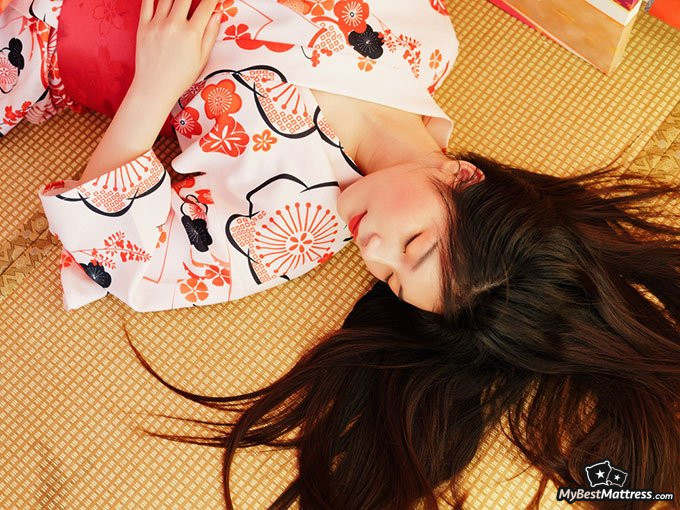
A tatami is a great option as it has been tested a lot elsewhere. For example, in Japan, sleeping on the floor is extremely common - many people prefer to sleep on tatamis instead of beds.
Futon
Futons are somewhat similar to mattresses, as they both offer some softness and provide comfort. But they’re a lot thinner and definitely not as comfortable, nor as soft.
If it’s an extremely soft one, you might not be able to say that you ditched the mattress and now sleep on the floor, but it’s really good for the adjustment period of sleeping on the floor.
Yoga Mat
Another option you have is sleeping on a yoga mat. It might not be as comfortable as a futon is, but it has its own benefits. Yoga mats are usually inexpensive, and you might have one around already.

So, if you’re trying out sleeping on the floor, consider a yoga mat as one of your base options.
Blankets
Probably the cheapest option, as everyone has them around. You can stack blankets. It will probably not provide much comfort, but it’s a great cheap option. What’s good when it comes to stacking blankets is that it’s adjustable.
You may always add or take off a blanket if you’re just starting to sleep on the floor. So you may start off with five of them and end up having only one left when you get more used to sleeping on the floor.
All these are just a few options for you to try out if you want to know how to sleep on the floor. You can get creative and try out your own ideas on how to soften the ground you’ll sleep on.
My tip would be combining these things to get as comfortable as possible, don’t stick to just one option, especially at first, when you’re still not used sleeping on the floor.
Take It Gradually
An extremely important thing to note while trying to sleep on the floor is that you can’t expect immediate results. Nor can you simply lie down on a hard floor and sleep. Your body won’t like the sudden changes, and your sleep quality will suffer considerably.
Doing that, you might wake up with intense pains at first. But know that it might be more of a soreness as your muscles are hard at work doing the job that the mattress was doing before - supporting your body. Try to push through this first phase if you really are serious about sleeping on the floor.
Also, what’s crucial to know is that you need layers at first. The more gradually you remove the softness, the more likely it will be that you stick to actually sleeping on the floor.

The first night, find all the softening materials and add them to your freshly made bed. Before your second sleep on the floor, or even after a few nights, take off one layer and try to sleep then.
Conclusions
Sleeping on the floor is rather uncommon; most of us simply adore the comfort of our beds. But some people still choose to switch to sleeping on the floor.
So, you might wanna know: "is sleeping on the floor good for you?" It is in some cases. Some people chase the benefits it might provide, like alleviating pain, helping your posture, making you more productive, or even providing you with more space in your bedroom.
Although it has its drawbacks too. One of them is the major one for ensuring your sleep quality - it’s uncomfortable. Also, it might be just a little too cold for you to sleep on the floor. All this can be alleviated slightly if you prepare right mentally, find something to soften the ground, and take it gradually.
If you want to know if I’d advise sleeping on the floor - I wouldn’t. While it might be a thing to try if you’re desperate for change, I believe that you’re better off sticking to a mattress. If you’d like to avoid sinkage, opt for a firmer mattress instead of taking the drastic change of sleeping on the floor.
Also, if you’re trying to change up your sleeping routine or you’re experiencing any back pains, you could try to change your sleeping position. That will bring you the change you’re looking for without taking away the comfort necessary for a good quality sleep.
Scientific References
1. Michael T. 'Instinctive sleeping and resting postures: an anthropological and zoological approach to treatment of low back and joint pain'
2. Kovacs M. Abraira V., Andrés P., et al 'Effect of firmness of mattress on chronic non-specific low-back pain: randomised, double-blind, controlled, multicentre trial'
3. Okamoto-Mizuno K., Mizuno K. 'Effects of thermal environment on sleep and circadian rhythm'
Leave your honest feedback
Leave your genuine opinion & help thousands of people to choose the best mattress. All feedback, either positive or negative, are accepted as long as they’re honest. We do not publish biased feedback or spam. So if you want to share your experience, opinion or give advice - the scene is yours!







